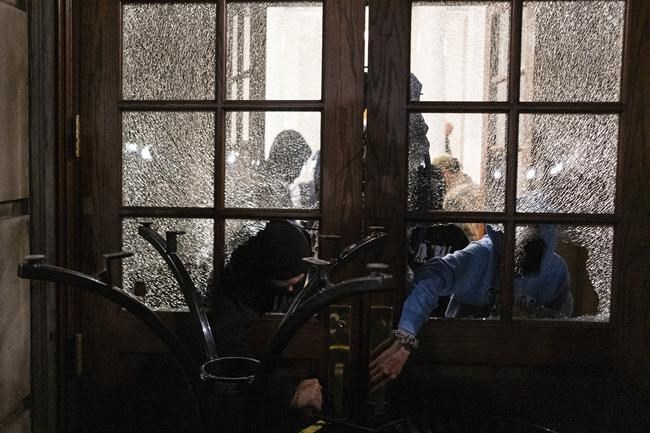
FILE - Students with the Gaza Solidarity Encampment block the entrance of Hamilton Hall at Columbia University after taking over it, April 30, 2024 in New York. (Marco Postigo Storel via AP, File)
Republished January 16, 2025 - 9:11 AM
Original Publication Date January 15, 2025 - 9:16 PM
WASHINGTON (AP) — Many colleges accused of tolerating antisemitism on their campuses have been settling with federal civil rights investigators in the weeks before the inauguration of President-elect Donald Trump, who urged a tougher response to campus protests against the war in Gaza.
By settling with the Education Department, the schools close the cases against them as long as they meet the terms of the agreements, which mostly have required training, policy updates and reviews of past complaints.
But many colleges at the center of the highest-profile cases — including Columbia and Cornell — face investigations that remain unresolved and could run the risk of harsher penalties after Trump takes office. Trump has not said what he would like to see come of the investigations, but he has threatened to revoke federal money for schools that fall short of his demands.
“Colleges will and must end the antisemitic propaganda or they will lose their accreditation and federal support,” Trump said in a virtual address to Jewish donors in September. “No money will go to them if they don’t.”
Settlements with the Education Department’s civil rights branch have piled up in recent weeks with the University of Washington, the University of California, Johns Hopkins, Rutgers and the University of Cincinnati. Those follow other voluntary agreements signed by Brown and Temple universities, along with the University of Michigan.
University presidents are “desperate” to enter agreements now “because Donald Trump is coming and there’ll be hell to pay if they don't,” said Kenneth Marcus, who led the Education Department's Office for Civil Rights during Trump's first term and now leads the Brandeis Center, a Jewish civil rights nonprofit.
“They don’t want their cases to still be pending on the docket when the new administration takes office,” he said. “They understand that the price of settlement is about to increase.”
The flurry of recent deals has drawn outrage from Republicans in Congress who say the Biden administration is letting colleges off the hook.
Rep. Tim Walberg, R-Mich., chair of the House Education and Workforce Committee, said the settlements are “toothless” and fail to hold colleges accountable for permitting antisemitism. In a statement, he said the Trump administration should “examine these agreements and explore options to impose real consequences on schools.”
One of the committee's priorities will be “calling out woke higher education institutions — especially those that allow antisemitism to run rampant,” Walberg said at a Wednesday meeting.
More than 100 U.S. colleges and school districts remain under investigation over alleged antisemitism or Islamophobia following the Oct. 7 attack by Hamas on Israel. That includes Columbia, Cornell, Yale, Princeton and other prestigious schools targeted by a Republican campaign against antisemitism.
The Department of Education investigations stem from complaints that schools violated Title VI, which bars discrimination or harassment on the basis of race, color and national origin at colleges and universities that receive federal funding.
Several colleges facing investigations declined to comment on their status.
Presidents of several universities were called before Congress last year over their handling of pro-Palestinian protests, contributing to the resignations of Claudine Gay at Harvard, Liz Magill at Penn and Minouche Shafik at Columbia.
The vast majority of Education Department civil rights investigations end with voluntary deals negotiated with schools. If they can’t reach a settlement, the agency can refer the case to the Justice Department or move to cut off the school’s federal money — an extreme sanction that has almost never been used.
Whether Trump pushes the Education Department to use the so-called “nuclear option” is still in question. But without a deal before Jan. 20, colleges raise the risk that they could become test cases for Trump, who has been openly hostile to universities that he sees as hotbeds of liberalism.
Marcus said the incoming Trump administration has sent clear signals that it's serious about invoking the “ultimate remedy” against offenders.
“I expect that there will be serious movement towards this from the Office for Civil Rights,” he said. “The question is whether university administrators will respond quickly and effectively enough to avoid that fate.”
Losing access to federal money is usually seen as a death sentence for colleges. A total cutoff would also mean their students could not use federal financial aid.
It couldn’t happen instantly, however. The Education Department can terminate federal money only if it fails to gain voluntary compliance from the school and only if it’s approved by an administrative law judge. There would have to be a hearing, and there would be opportunities for the school to appeal the decision.
As Republicans take control of both chambers of Congress, there’s also a renewed push for legislation on the subject. A December report coordinated by House Speaker Mike Johnson, R-La., found that colleges across the U.S. failed to stop antisemitism amid last year’s demonstrations, highlighting cases at Harvard, Columbia and UCLA.
The report called for new legislation “to support students and ensure accountability,” and it endorsed legislation to cut off federal money at schools that support divestment from Israel. It called on the executive branch to “aggressively enforce” civil rights laws, saying universities that fail to curb antisemitism “are unfit stewards of taxpayer dollars should be treated accordingly.”
___
The Associated Press’ education coverage receives financial support from multiple private foundations. AP is solely responsible for all content. Find AP’s standards for working with philanthropies, a list of supporters and funded coverage areas at AP.org.

News from © The Associated Press, 2025